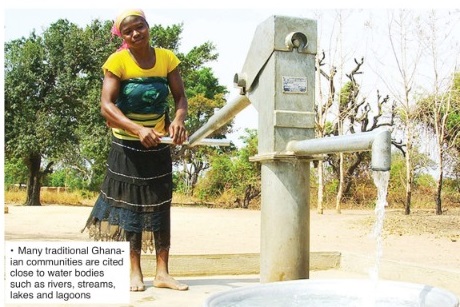
The search for water remained one of man’s earliest principal considerations, particularly in the determination of settlements. Water, therefore, became a paramount decider as to where any group of people would finally settle and make their home.
It is therefore not surprising that many traditional Ghanaian communities are cited close to water bodies such as rivers, streams, lakes and lagoons. Water plays an important role in the lives of mankind.
Even though people now do not search for water bodies before making a decision to settle or build their homes, water accessibility factor always surfaces in people’s choice of homes or areas to settle. This is particularly so since many areas struggle to get access to potable water in Ghana.
No matter where one settles, water, obviously remains a principal consideration. Water insecurity is a growing concern globally, particularly for developing countries such as Ghana, where a range of factors including population growth and urbanisation are putting pressure on water provisioning systems.
Water scarcity affects more than 40 per cent of the global population and is projected to rise. Over 1.7 billion people are currently living in river basins where water use exceeds recharge.
For instance, recognising the growing challenge of water scarcity, the United Nations General Assembly launched the Water Action Decade on March 22 2018, to mobilise action that will help transform how we manage water.
The Water Action Decade (2018-2028) will accelerate efforts towards meeting water-related challenges, including limited access to safe water and sanitation, increasing pressure on water resources and ecosystems, and an exacerbated risk of droughts and floods.
And because of how people struggle particularly in the cities and urban areas to get access water, many have resorted to all manner of activities such as rainfall harvesting and borehole and dugout drilling. This is because water has become a scant item in many communities in Ghana. This has made water gathering a significant part of each building venture.
The provision of potable water for human sustenance both now and in the future is one of the most critical issues in the world today. And as Ghana’s population grows, there is even greater pressure on the few water provision systems in the country.
Ghana’s population is now estimated at 29.6 million, up from the 24.5 million recorded during the 2010 Population and Housing Census.
Other indicators from the United Nations World Population Review Report (2017) estimate that life expectancy for females in Ghana is 64 years, that for males is 62.1 years, with the fertility rate at 3.8 children per woman. With the rise in the country’s population, demand for water certainly has increased.
This probably will lead to a reduction in the per capita annual availability of water.
A study conducted by Dr Jonathan D. Quartey of the Department of Economics, Kwame Nkrumah University of Science and Technology, titled: “Towards A Sustainable Allocation Of Potable Water In Ghana: Evidence From Kumasi” published in International Journal of Development and Economic Sustainability on March 2014, called for a sustainable allocation of water resources to delay or even avoid ‘water stresses’ for present and future generations.
According to the study, by the year 2025, when the population of Ghana is projected to be 35.44 million, the annual surface water that will be available to each Ghanaian would be 950 cubic metres, below the 1,000 cubic metres per capita annual water availability threshold.
For instance, according to Dr Quartey, in 1960, when the population of Ghana was 6.77 million, the annual surface water available to each Ghanaian was 4,950 cubic metres.
Water stress occurs when the demand for water exceeds the available amount during a certain period or when poor quality restricts its use. Water stress causes deterioration of fresh water resources in terms of quantity. This is partly due to over use of groundwater or aquifer over-exploitation.
Due to the chronic water shortages or water crisis that has become a perennial feature of many communities in the country, particularly in the major towns and cities, many households resort to the drilling of boreholes and dugouts—thus reducing the volume of the groundwater.
The usage of groundwater has therefore become the most cost effective means of water supply for many urban and rural settlers in the country.
This has led to the drilling of over 10, 000 boreholes and over 45, 000 hand-dug wells in the country, according to a study conducted by B. K. Kortatsi of the Water Resources Research Institute on Groundwater utilisation in Ghana.
The Water Resource Commission (WRC) is the agency mandate to manage Ghana’s groundwater resources. It was established by an Act of Parliament (Act 522 of 1996) with the mandate to regulate and manage Ghana’s Water Resources and co-ordinate government policies in relation to them.
The Act stipulates that ownership and control of all water resources are vested in the President on behalf of the people, and clearly defines the WRC as the overall body responsible for water resources management in Ghana.
World Water Day
Even though groundwater provides new alternative to people to find access to water, lack of proper management could lead the country into water stress. Water is so critical to the survival and sustenance of any group of people.
This is why perhaps the UN has set aside March 22 each year as the World Water Day to draw attention to the importance of water and how it can be protected. The occasion is used to highlights the importance of freshwater as well as to advocate for the sustainable management of freshwater resources.
This year’s celebration of the World Water Day is on the theme: “Valuing water.”
Way forward
The Acting Country Director of Water Aid, Mr Jesse Coffie Danku underscored the need to institute mechanisms to gather enough data on groundwater to encourage its sustainability.
He said lack of groundwater data and information as well as inadequate groundwater-specific policy did not make it easy to access groundwater quality problems such as arsenic, fluoride, microbiological pollution and salinity.
For him, lack of data on groundwater presented a significant risk and hampers efficient and sustainable management of the resource (groundwater) in Ghana.
Quoting Vincent Casey, WaterAid’s Senior WASH Manager for Water-International programmes, Mr Coffie Danku said groundwater provided much-needed protection against the impacts of climate change, acting as a buffer to changing water availability and quality in many parts of the world.
Mr Danku noted that the climate clock was ticking and if efforts were not made to better-understand, value and protect this vital resource (groundwater), making it a central feature of climate change adaptation strategies, then we face a very bleak future.”
The law
Under Regulations 23 (1) and (3) of the Drilling Licence and Groundwater Development Regulations, (2006) L.I. 1827, individuals, corporate organisations, and NGOs who drill or intend to drill water wells are to engage the services of only licensed water well drillers who are duly licensed by the WRC.
Similarly, by the regulations, water well owners are also required by law to register their boreholes with the Commission to enable the effective management and sustainable utilisation of groundwater resources in Ghana.
Enforcement
The Executive Secretary of the Water Resource Commission (WRC), Mr Ben Ampomah said the issue of water prospecting and drilling contracts to drilling companies were only legislate if such companies possessed drilling licences.
Adding that noncompliance with these regulations were an offence subject to prosecution.
He further urged the public to visit the website of the Commission at wrc-gh.org for list of licensed drillers or perhaps contact the Commission.
He however, advised unlicensed borehole drillers to register with the Commission to save cost and prevent ill health to their clients.
BY BENEDICTA GYIMAAH FOLLEY




